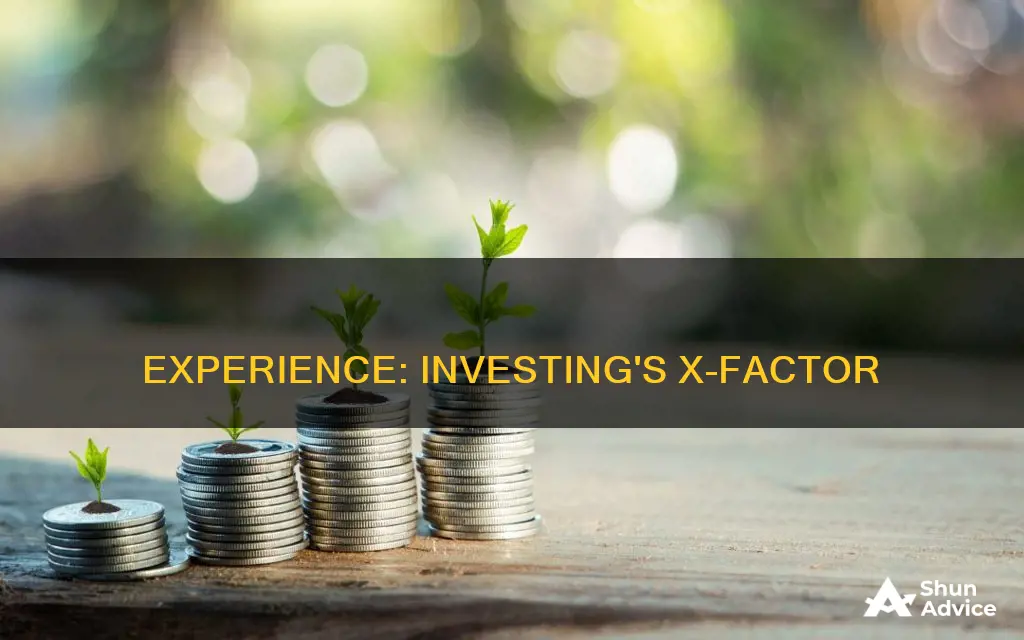
Experience influences personal investing in the future by shaping an individual's financial goals, risk tolerance, and timeline. It also helps to inform investment strategies and decisions about asset allocation and diversification. For example, an experienced investor is more likely to have a long-term perspective, seeking investments that offer stability and compound interest over time. They may also be more comfortable taking calculated risks, having learned from past successes and failures. Additionally, experience can help individuals understand their own personalities and how their traits influence their investing behaviour. This self-awareness can lead to more informed decisions and a more tailored investment strategy.
What You'll Learn

How does investing work?
Investing is a way to make your money work for you. It involves putting your money into various financial products or accounts with the goal of growing your wealth over time. This can include stocks, bonds, mutual funds, annuities, and real estate. The potential for greater rewards with investing comes with greater risk.
There are three main types of investment accounts: retirement investment accounts, education investment accounts, and brokerage investment accounts. With a retirement investment account, you put money aside for the future, often with tax advantages. An education investment account is used to pay for qualified educational expenses and also typically offers tax advantages. A brokerage investment account allows you to transfer funds to a brokerage firm and choose individual investments, but your money is not protected against loss and there are no tax advantages.
When investing, it's important to understand the risks involved. Key risks include business risk, volatility, interest rate risk, liquidity risk, and inflation risk. It's also important to consider your level of risk tolerance and how much time you have before you need to use the money. If you have a long time horizon, you may be able to take on more risk for the potential of greater rewards.
Diversification is another important concept in investing. By investing in a variety of companies and sectors, you can spread out the risk and potentially reduce losses. This can be achieved through investment funds, which are typically classified based on risk, from conservative to aggressive.
Compound interest is another key factor in investing. This is interest on interest, where the interest is added to the principal sum of a loan or deposit, allowing your earnings to grow over time.
Before investing, it's important to set clear goals, understand the different types of investments available, and learn about investment strategies. It's also crucial to consider your financial situation and risk tolerance, as investing does come with the risk of losing money.
Starbucks: A Brew Worth Betting On
You may want to see also

What are the risks of investing?
Investing is using a resource, usually money, with the expectation that it will generate increased income or grow in value. All investments carry some degree of risk. The risks of investing include:
- Market risk: The risk of investments declining in value due to economic developments or other events that affect the entire market.
- Equity risk: The risk of loss due to a drop in the market price of shares.
- Interest rate risk: The risk of losing money due to a change in the interest rate. For example, if interest rates rise, the market value of bonds will drop.
- Currency risk: The risk of losing money due to a movement in the exchange rate. For example, if the US dollar becomes less valuable relative to the Canadian dollar, US stocks will be worth less in Canadian dollars.
- Liquidity risk: The ease or difficulty of cashing out of an investment.
- Concentration risk: The risk of loss because your money is concentrated in one investment or type of investment.
- Credit risk: The risk that the government entity or company that issued the bond will run into financial difficulties and won't be able to pay the interest or repay the principal at maturity.
- Reinvestment risk: The risk of loss from reinvesting principal or income at a lower interest rate.
- Inflation risk: The risk of a loss in purchasing power because the value of your investments does not keep up with inflation. Inflation erodes the purchasing power of money over time.
- Foreign investment risk: The risk of loss when investing in foreign countries. When investing in foreign companies, you face additional risks such as the risk of nationalization.
It's important to note that these risks can vary depending on the type of investment and the individual's circumstances. It's crucial to carefully consider and understand the risks associated with any investment decision before committing your money.
Theft of Investments: A Growing Concern
You may want to see also

How much money do I need to start investing?
Investing is one of the best ways to grow your money over time. However, a common belief that prevents people from getting started is that you need a large amount of money to get in the game. The truth is, the actual amount you need might be less than you think.
There is no one-size-fits-all answer to how much money you need to start investing. It depends on your financial situation, investment goals, and risk tolerance. Here are some guidelines to help you determine how much money you need to start investing:
- Pay off debt first: Before investing, it is generally recommended to pay off any high-interest debt, such as credit card debt. The interest you pay on this debt is likely to cost you more than what you would earn through investing.
- Make a budget: Create a monthly budget that outlines your basic expenses (rent, utilities, transportation, groceries, loan payments, etc.) and discretionary spending. This will help you determine how much you can afford to invest while still covering your essential expenses.
- Emergency fund: It is important to have an emergency fund to cover unexpected expenses, such as a car repair or medical bill. A general rule of thumb is to have at least six months' worth of expenses or income set aside in a savings account.
- Other savings goals: Consider any other short-term or long-term savings goals you may have, such as a vacation fund, a down payment on a car, or a home remodel. Make sure to set aside money for these goals separately from your emergency fund.
- Investing a small amount: You can start investing with a small amount of money, thanks to zero-fee brokerages and fractional shares. Some apps, like Stash or Acorns, allow you to start investing with as little as $3 a month. However, these apps may not offer much handholding if you are new to investing.
- Robo-advisors: If you have a slightly larger amount to invest (typically $500 to $5,000), you can use a robo-advisor. These services use algorithms and human assistance to build an investment portfolio for you.
- Financial professionals: If you have a more sizable amount to invest, you can work with a financial professional to create a customised investment portfolio. The minimum deposit will vary depending on the financial institution.
Remember, investing is a long-term activity. It is important to assess your financial situation, set clear goals, and understand the risks involved before investing. Start with an amount that you can commit to investing every month, even if it is a small sum. Consistency is more important than the overall amount.
Paying Off Debt: The Ultimate Investment Strategy?
You may want to see also

What are the benefits of investing early?
Investing early in life has several advantages. Here are some of the key benefits:
Compound Interest
Compound interest, or earning interest on interest, is a powerful tool for investors. The longer your investments accumulate compound interest, the more your wealth will grow. For example, consider two individuals who invest $2,000 annually with an average growth rate of 10%. If the first person invests for 10 years starting at 25 and stops investing at 35, by the time they retire at 65, their investment would have grown to $556,197. On the other hand, if the second person invests the same amount for 30 years starting at 35 and continuing until 65, their investment would only amount to $328,988. Despite investing for a shorter period and a lower total amount, the first person benefits from the power of compound interest, resulting in a higher final sum.
Time and Risk
The length of time you have to invest directly impacts the amount of risk you can withstand. Younger investors have more time to recover from potential losses, allowing them to take on more volatile investments that offer higher potential returns. Additionally, with a longer investment horizon, you can ride out market fluctuations and economic downturns, giving your investments time to recover and grow.
Experience
Investing early in life provides valuable experience in financial management and investment strategies. By starting early, you have more time to study the markets, refine your investment techniques, and learn from your successes and failures. This experience will help you make better investment decisions and avoid common pitfalls.
Improved Financial Habits
Investing early encourages the formation of good financial habits. It promotes discipline in spending, budgeting, and saving. You learn to focus on balanced finances, cut unnecessary expenses, and prioritize investing or saving for the future. These habits will benefit you throughout your financial life.
Financial Security and Freedom
Starting to invest early sets the foundation for your financial security and freedom later in life. It reduces the risk of being financially strapped and stuck in a job you dislike. With early investing, you gain the freedom to pursue your passions and make confident financial decisions without fear.
In summary, investing early provides the benefits of compound interest accumulation, higher risk tolerance, valuable experience, improved financial habits, and increased financial security and freedom. It is a wise decision that can pay off significantly in the long run.
Time is Money: The Power of Investing Early for Retirement
You may want to see also

How can I make informed investment decisions?
Experience influences investment decisions in the future, and there are several ways to make informed investment decisions.
Firstly, it is important to draw a personal financial roadmap. This involves evaluating your entire financial situation, including your goals and risk tolerance. Understanding your risk tolerance can help you determine the types of investments that align with your comfort level. All investments carry some risk, and it is crucial to recognize that you may lose some or all of your money. The potential for greater returns often comes with higher risk. Therefore, assessing your risk tolerance is essential in making informed investment decisions.
Secondly, consider diversifying your investments across different asset categories, such as stocks, bonds, and cash. Historically, these asset categories have not moved in the same direction under different market conditions. By investing in multiple categories, you can reduce the risk of significant losses and smoothen the overall investment returns of your portfolio. Diversification is a key strategy to protect against market volatility and minimize the impact of downturns in any single asset class.
Thirdly, it is important to have an emergency fund. Smart investors often prioritize building a savings cushion to cover unexpected expenses, such as sudden unemployment. Aim to save enough to cover at least six months' worth of living expenses. This emergency fund can provide a safety net and help you avoid dipping into your investments prematurely.
Additionally, pay off high-interest credit card debt. Credit card debt can be costly, and there are rarely investment strategies that offer better risk-adjusted returns than simply paying off this type of debt. By eliminating high-interest debt, you free up more of your money for investing and reduce the burden of compounding interest.
Lastly, consider dollar-cost averaging. This investment strategy involves consistently investing a fixed amount at regular intervals over a long period. By doing so, you buy more of an investment when its price is low and less when it is high. Dollar-cost averaging helps protect you from the risk of investing a large sum at an inopportune time and can be particularly effective in volatile markets.
In summary, making informed investment decisions involves understanding your financial situation and risk tolerance, diversifying your investments, maintaining an emergency fund, paying off high-interest debt, and considering strategies like dollar-cost averaging. These steps can help you navigate the complexities of investing and improve your chances of achieving your financial goals.
Mutual Funds: Why Invest?
You may want to see also
Frequently asked questions
Experience will influence your personal investing in the future by helping you to make more informed decisions. You will learn to evaluate your comfort zone when it comes to taking on risk and understand the importance of diversification to reduce risk. You will also be able to make more realistic financial plans and set clear objectives, which will help you to reach your financial goals.
Experience will help you to understand your risk tolerance and make more informed decisions about the level of risk you are comfortable taking on. You will also be able to make more realistic evaluations of the potential returns on your investments.
Experience will help you to understand the importance of diversifying your investments across different asset classes and investment vehicles to reduce risk and capitalize on market fluctuations.
Experience will help you to make more realistic financial plans and set clear objectives, which will increase your chances of reaching your financial goals.
Experience will help you to tailor your investment strategy to your financial goals, risk tolerance, and timeline. You will also be better equipped to make adjustments to your strategy as market conditions change.
Experience will help you to make more rational and informed investment decisions by controlling your emotions and allowing you to take a longer-term view.







